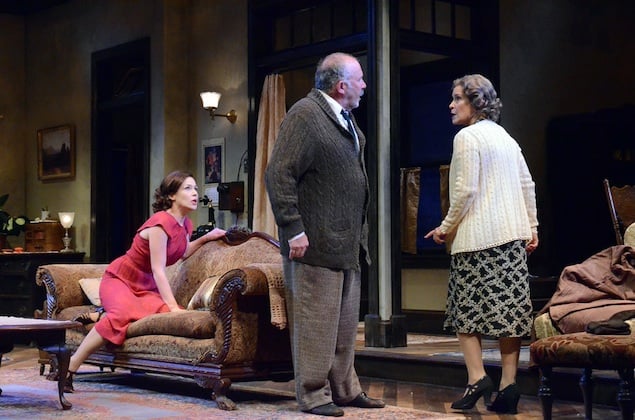The dingy 1930s apartment splayed across the stage at Olney Theatre Center speaks, before the show ever starts, to the sort of proud impoverishment in which the Berger family of Clifford Odets’s Awake and Sing! lives. A Jewish family in the Great Depression-era Bronx, the Bergers are barely treading water, and scenic designer Jack Magaw nails it in one.
The blended odors of musty hallways and boiled cabbage don’t literally hang in the air, but they linger in the atmospherics of Olney’s highly satisfying, often soul-stirring production. Serge Seiden has directed an ensemble of some of the area’s best actors, and proved that Odets’s 1935 kitchen-sink drama about life on the underside of American capitalism can still pack a gut punch, 79 years after its debut with the legendary, politically vocal Group Theatre.
That doesn’t mean that aspects of the play and the Olney production don’t lapse into ethnic stereotypes now and then; or that the two female characters onstage, and a third who comes up in conversation, don’t suffer from being caricatured as the nagging wife and the wayward daughter, responsible for causing men much pain. But never mind all that. This cast and director give the characters inner lives that go beyond caricature. And the level of ensemble work comes close to the memorable 2006 production at Arena Stage, directed by Arena cofounder Zelda Fichandler.
Twentysomething Ralph Berger (Alex Mandell) feels he’s been deprived of everything, from skates as a child to life itself, now that he’s grown. He works a crummy job for $16 a week, which he hands over to his domineering mother Bessie (Naomi Jacobson), and sleeps on a cot in the living room because his grandpa Jacob (Rick Foucheux) has the spare bedroom. Jacob was a barber, but his true passion is politics: He spouts Marxist slogans and calls for revolution, though based on his soft-heartedness, one expects he’d prefer the nonviolent kind.
Younger audience members—who should check this play out if they like serious drama—may not be aware of how many Americans, particularly children of European immigrants, were attracted to Marxism and Communism in the 1930s. It seemed to many of them during the Depression that capitalism didn’t work any more. The slaughters and other human-rights abuses under Stalin in the Soviet Union weren’t widely understood. Not that Jacob has any fellow travelers in the family, but at least his grandson listens, and in turn, Jacob lends a sympathetic ear to the young Ralph’s woes.
Bessie tries to run a tight ship. Worn and faded her furniture may be, but she’s hung lace curtains at the window and keeps the place neat as a pin. She claims to want the best for everyone, but to her, that means berating her father for his idealism and his opera records, preventing Ralph from living his own life or seeing the girl he loves, and forcing her rebellious daughter Hennie (Laura C. Harris) to marry a timid though gainfully employed immigrant, Sam (Joshua Morgan), whom she doesn’t love.
Though Bessie’s husband, Myron (Paul Morella), a dreamer and a milquetoast, carries no authority in the home, Bessie has nothing but admiration for her brother, Morty (a blustery Richard Pelzman), who deigns to visit his poor relations now and then. A successful businessman, Morty fights off the labor unions and dismisses his father Jacob for having entered his “second childhood.” Jacobson and Pelzman deserve credit for letting us glimpse Bessie’s and Morty’s softer sides, if only through the odd gesture or look. Bessie, a woman of little imagination, has become a petty tyrant in her desperate need to keep the family out of the poorhouse, which Jacobson ably shows.
Chris Genebach’s terrific portrayal of Moe Axelrod, who rents a room at the Bergers’, stands out for the many hues he brings to the character. A World War I vet with a wooden leg, Moe makes a living as a small-time crook and is the manliest man in the place, with a major “yen” for Hennie Berger, who dislikes him intensely—or so she’d have him think. Genebach’s subtle shifts from hardboiled con man to pining lover to sympathetic observer are just swell.
Olney’s Awake and Sing! demonstrates that a vintage three-act play with lots of meaty roles and a point of view can simmer into a tasty stew.
Awake and Sing! is at Olney Theatre Center through October 19. Running time is about two and a half hours, including one intermission. Tickets ($55 to $65) are available online.
















